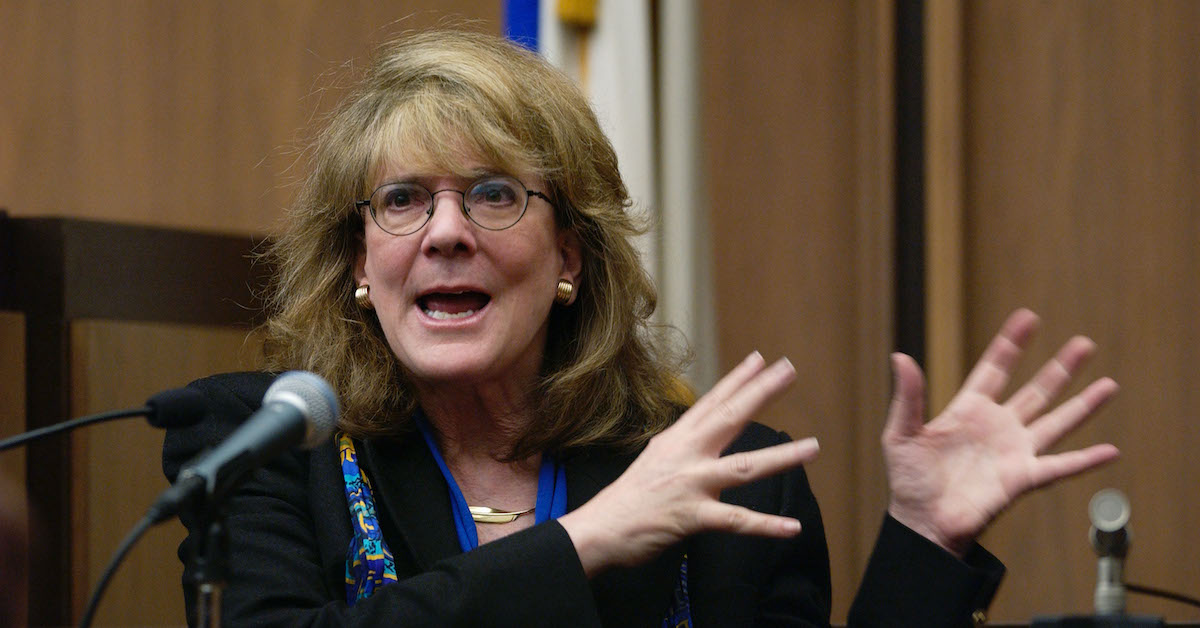
Elizabeth Loftus, whose psychological research specializes in false memories, testifies in Paul Shanley child abuse trial.
One of the four women listed as Ghislaine Maxwell’s alleged victims in an indictment, Annie Farmer has given detailed accounts of her alleged sexual abuse by Jeffrey Epstein and his accused co-conspirator for decades. One of the two women profiled in the New York Times as “The Sisters Who First Tried to Take Down Jeffrey Epstein,” the stories of Annie and Maria Farmer have been known to the New York City Police Department and the FBI for some 25 years.
They have also been known to the press, in print, podcast, documentary and broadcast.
In 1996, Annie Farmer was 16 years old when she said that Epstein invited her to his New Mexico ranch, where Maxwell’s allegedly rubbed her chest during what she reportedly described as a troubling topless massage. It is undisputed that Farmer did not write about the alleged incident in her diary—because she stopped keeping journal entries shortly after meeting Epstein, prosecutors say.
Faced with the prospect of such disturbing witness testimony—about events stretching back a quarter of a century—Maxwell’s defense team revealed on Monday that they want to call an expert known for attempting to undermine the reliability of memory.
University of California professor Elizabeth Loftus has done so hundreds of times before, including in the trials of Harvey Weinstein, Robert Durst, Bill Cosby, Jerry Sandusky, O.J. Simpson, and Ted Bundy. She also testified in defense of Paul Shanley, a now-deceased priest who served 12 years in prison following his conviction for raping a child.
“It is expected that Dr. Loftus, a psychologist who specializes in the study of memory, will focus on the memory aspects of this case,” Maxwell’s lawyer Jeffrey Pagliuca wrote a 13-page legal letter. “Based on her education, training, experience, and research, her testimony will concern the workings of human memory, the effects of suggestion on memory, the mechanism of creation of false memories, the characteristics of false memories, how memory fades and weakens over time, and how memory becomes more vulnerable to contamination. She will describe scientific research showing that false memories can be described with confidence, detail, and emotion, just like true memories. This can occur when people come to believe in these experiences and are not deliberately lying.”
Dated Nov. 1 but released on Monday, the defense expert disclosure states that Loftus will testify that false memories can be triggered by “suggestive activities,” like media coverage.
“In particular ‘memories’ can be described with confidence, detail and emotion, even when they are false. She will point out some of the suggestive activities that occurred in this case,” the filing states. “She will explain how media coverage and other publications (including but not limited to newspaper and magazine articles, news reports, television shows, documentaries, books, podcasts, websites, etc.) and discussions/ conversations with others, can be sources of suggestion. She will explain how, in a case like this one, suggestion can lead individuals to the construction of distorted memories.”
Chronicling the fallout of her role in the Weinstein trial, a New Yorker profile examined how Loftus, in the assessment of the article’s headline, “Changed the Meaning of Memory“—and how her life’s work collided with a cultural moment of reckoning.
“If the MeToo movement had an office, Beth’s picture would be on the ten-most-wanted list,” her brother Robert told the magazine.
No stranger to controversial clients, Loftus wrote a book “Witness for the Defense” and, according to the profile, only turned down one case for reasons of “repugnance”: that of a man accused of operating the gas chambers at Treblinka. After testifying for Weinstein, she told the paper, she received swift professional blowback. She had a speech canceled. A colleague, a feminist theory professor at the university, told her “How could you!” And her students wrote a letter to the dean asking her to be removed from faculty.
“I was reeling,” Loftus told the New Yorker. “How about the presumption of innocence? How about ‘the unpopular deserve to have a defense’?”
Along with Loftus, Maxwell’s defense also seeks the testimony of another high-profile expert: Park Dietz, a forensic psychiatrist who rose to national prominence during the case of Ronald Reagan’s would-be assassin John Hinckley Jr., who was ultimately acquitted by reason of insanity. Dietz is being called here to question the prosecution’s claims that Maxwell “groomed” her alleged victims.
“Dr. Dietz is aware of no authority—no journal articles, no studies, no tests, nothing—to support a theory of grooming-by-proxy,” Maxwell’s defense memo states. “Such a theory has not gained any acceptance (let alone general acceptance) in the relevant community; it has not been peer-reviewed; it has not and cannot be tested; and there is no known or potential rate of error.”
U.S. District Judge Alison Nathan, who is presiding over Maxwell’s trial, has scheduled a hearing on Wednesday to determine which government and defense expert witnesses will be permitted to testify at trial—and the scope of any possible testimony.
The so-called Daubert hearing—as such proceedings are known—allow for alleged victims to attend. Judge Nathan ordered the parties to notify any alleged victim referred to in the defense’s redacted filing of this right. The public portion of the Nov. 1 expert disclosure by Maxwell’s team does not list any of them by name.
Of the four alleged victims alluded to in Maxwell’s indictment, only one of their identities is public: Annie Farmer. Farmer did not immediately respond to Law&Crime’s message requesting comment.
Read the filing, below:
(Photo by Jodi Hilton/Getty Images)